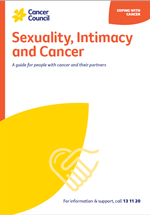- Home
- About Cancer
- Cancer treatment
- Chemotherapy
- Managing side effects
- Sexuality, intimacy and fertility
Sexuality, intimacy and fertility
Chemotherapy can affect your sexuality and fertility in emotional and physical ways. These changes are common. Some changes may be only temporary while others can be permanent.
Learn more about:
- Changes in sexuality
- Using contraception
- Changes in fertility
- Effects of chemotherapy on ovaries and sperm
Changes in sexuality
You may notice a lack of interest in sex or a loss of desire (libido), or you may feel too tired or unwell to want to be intimate. You may also feel less confident about who you are and what you can do.
There may be physical reasons for not being able to have sex or being interested in having sex (e.g. vaginal dryness or erection difficulties). Changes in how you look can also affect feelings of self-esteem and, in turn, your interest in sex.
If you have a partner, it may be helpful for them to understand the reasons why your libido has changed, and to know that people can usually have a fulfilling sex life after cancer, but it may take time. Some partners may feel concerned about having sex. They might be worried about injuring or hurting the person with cancer, or being exposed to chemotherapy drugs during sex.
Even if some sexual activities are not always possible, there are many ways to express closeness. Talking openly with your partner about how you’re feeling can be difficult but it is often very helpful. It’s important to take time to adapt to any changes. If you’re worried about changes to how you feel about yourself, your relationships or sexual functioning, you may find talking to a psychologist or counsellor helpful.
For more on this, see our general section on Sexuality, intimacy and cancer, and listen to our podcast on Sex and Cancer below.
Using contraception
In most cases, your doctor will advise you to use some form of barrier contraception (condom, female condom or dental dam) during treatment and for a period after. This is to protect your partner from any chemotherapy drugs that may still be in your body fluids.
As chemotherapy drugs can harm an unborn baby, your doctor may talk to you about using contraception for some months after chemotherapy. Although chemotherapy often affects fertility, it doesn’t always.
If you are in a heterosexual relationship and sexually active, you will need to use a reliable form of contraception to avoid pregnancy while having treatment. Talk to your specialist immediately if you or your partner become pregnant.
Changes in fertility
Chemotherapy can affect your ability to have children (fertility), which may be temporary or permanent. If you may want to have a child in the future, talk to your doctor before starting chemotherapy about how the treatment might affect you and what options are available.
Eggs (ova), embryos, ovarian tissue or sperm may be able to be stored for use at a later date. This needs to be done before chemotherapy starts. In some cases, hormone injections can reduce activity in the ovaries and protect eggs from being damaged by chemotherapy.
For more on this, see Fertility and cancer.
| Effects of chemotherapy | |
| On ovaries | Some chemotherapy can reduce the levels of hormones produced by the ovaries. This can cause your periods to become irregular or even stop for a while, but they often return to normal within a year of finishing treatment. If your periods do not return, the ovaries may have stopped working, causing early menopause. After menopause, you can’t get pregnant naturally. Signs of menopause include hot flushes, night sweats, aching joints, and dry or itchy skin. Menopause – particularly when it occurs under 40 – may, in the long term, cause bones to become weaker and break more easily. This is called osteoporosis. Talk to your doctor about ways to manage menopause symptoms. |
| On sperm | Some chemotherapy drugs can lower the number of sperm produced and reduce their ability to move. This can sometimes cause infertility, which may be temporary or permanent. The ability to have and keep an erection may also be affected (erectile dysfunction or impotence), but this is usually temporary. If impotence is ongoing, talk to your doctor. |
→ READ MORE: Other side effects
All my life I wanted to be a father. I didn’t want cancer to ruin my chances, so I stored my sperm before treatment started. I think of this as a bit of an insurance policy.
Zac
Podcast: Sex and Cancer
Listen to more of our podcast for people affected by cancer
More resources
A/Prof Kate Mahon, Director of Medical Oncology, Chris O’Brien Lifehouse, NSW; Katherine Bell, Dietetics Department, Liverpool Hospital, NSW; Brigitta Leben, Dietetics Department, Liverpool Hospital, NSW; Sophie Michele, 13 11 20 Consultant, Cancer Council SA; Dr Jess Smith, Medical Oncologist, Macquarie University Hospital, NSW; Karene Stewart, Consumer; Julie Teraci, Clinical Nurse Consultant, Skin Cancer and Melanoma, Cancer Network WA.
View the Cancer Council NSW editorial policy.
View all publications or call 13 11 20 for free printed copies.

